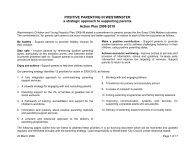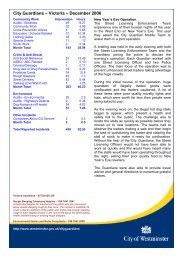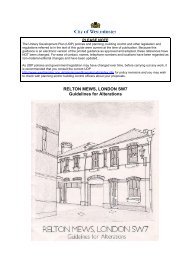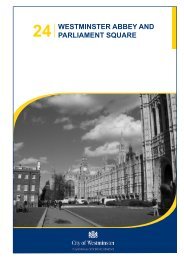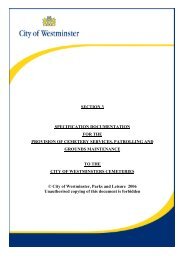Statement of Licensing Policy (2008) WCC - Westminster City Council
Statement of Licensing Policy (2008) WCC - Westminster City Council
Statement of Licensing Policy (2008) WCC - Westminster City Council
Create successful ePaper yourself
Turn your PDF publications into a flip-book with our unique Google optimized e-Paper software.
2.4.6 Proximity to residential accommodation is a general consideration with regard to theprevention <strong>of</strong> public nuisance. However the absence <strong>of</strong> residential accommodation inthe vicinity <strong>of</strong> premises in an area <strong>of</strong> cumulative impact is not a reason for exception.The nature <strong>of</strong> cumulative impact is that it is cumulative and affects not only theimmediate vicinity <strong>of</strong> the premises, but a wider area; thus the number <strong>of</strong> people visitingthe premises, the nature <strong>of</strong> licensable activities and the lateness <strong>of</strong> operations havean impact on an area as a whole, irrespective <strong>of</strong> whether or not there is residentialaccommodation in proximity to the premises.2.4.7 Revised Guidance Paragraph 13.36 specifi cally recognises that applications tovary capacities are directly relevant to special policies <strong>of</strong> cumulative impact. Thisaccords with the council’s view and practice in considering applications to varypremises licences in the Stress areas. Revised Guidance Paragraph 13.34 continuesto recognise that different types <strong>of</strong> premises have different impacts and it contrastsa large night club or a high capacity public houses with a small restaurant or theatre.This continues to give support for policies directed at different types <strong>of</strong> premises andlicensable activities in the Stress Areas and treating restaurants differently from pubsand premises with music and dancing.2.4.8 Revised Guidance Paragraph 10.43 recognises that capacity conditions can beattached for the promotion <strong>of</strong> the prevention <strong>of</strong> crime and disorder and refer toappropriate ratios <strong>of</strong> tables and chairs based on the capacity and door supervisionto control numbers on entry and exclude drunk or disorderly individuals. The councilfurther consider that prescribed capacity and the provision <strong>of</strong> minimum levels <strong>of</strong>seating and tables can also promote the licensing objective <strong>of</strong> the prevention <strong>of</strong> publicnuisance. Customers who have been seated in premises which are not crowded willbehave differently; they are less likely to have been talking at high volume and willleave the premises more quietly than the greater number <strong>of</strong> customers in equivalentlysized premises without capacity limits with more vertical drinking.2.4.9 The introduction <strong>of</strong> measures to reduce the extent <strong>of</strong> or remove opportunities forvertical drinking can address the underlying reasons for the special policies forcumulative impact. This can be by introducing fi xed seating and the conditions toprovide a minimum number <strong>of</strong> seats at all times and limiting sales to be by waiter orwaitress service only.442.4.10 The extension <strong>of</strong> hours beyond the core hours is <strong>of</strong> concern as there are greaterproblems <strong>of</strong> late night transport and disturbance. Late at night there is less maskingbackground noise and disturbance is greater if people are trying to sleep or are wokenup. Police resources are more stretched later at night.





